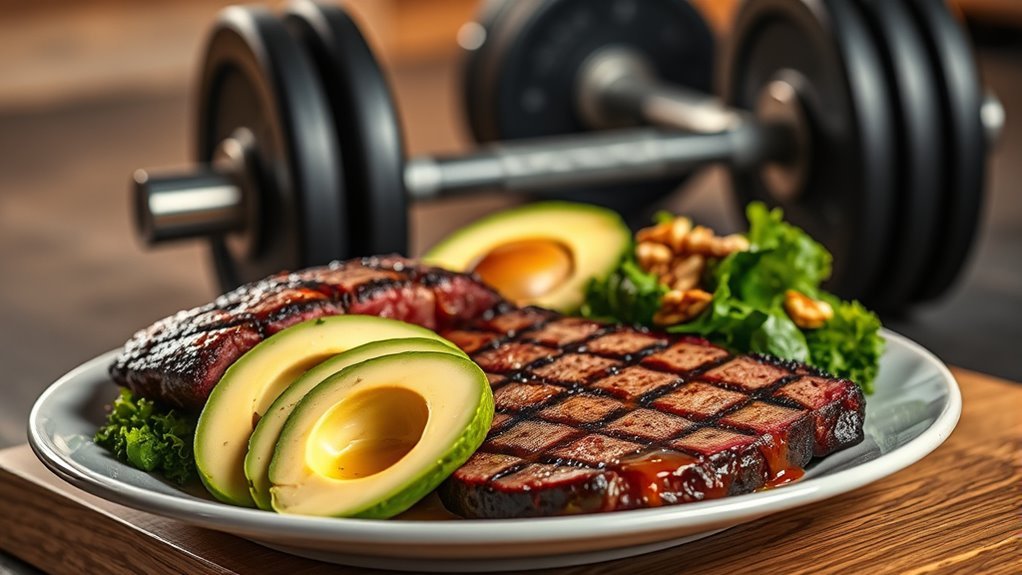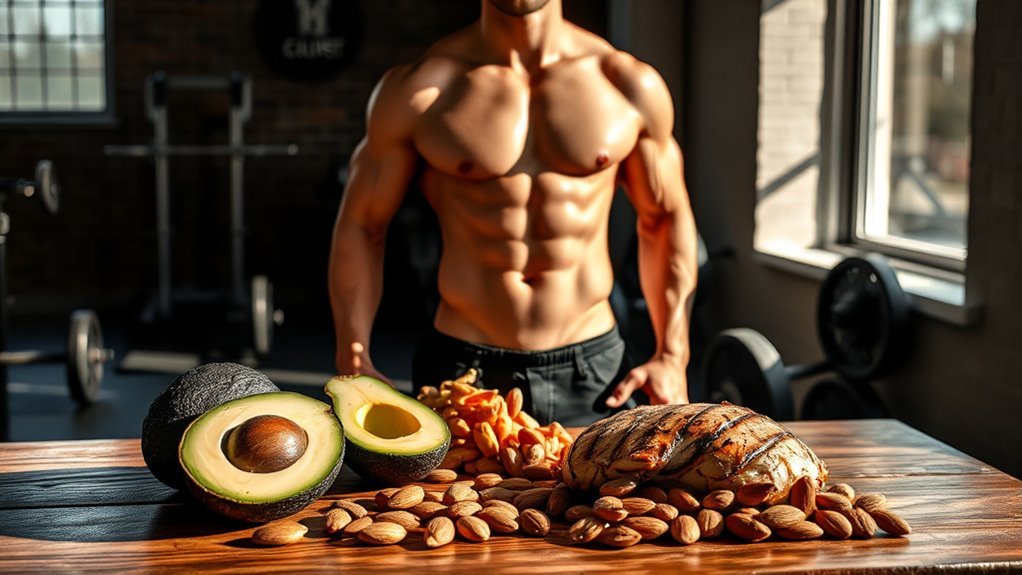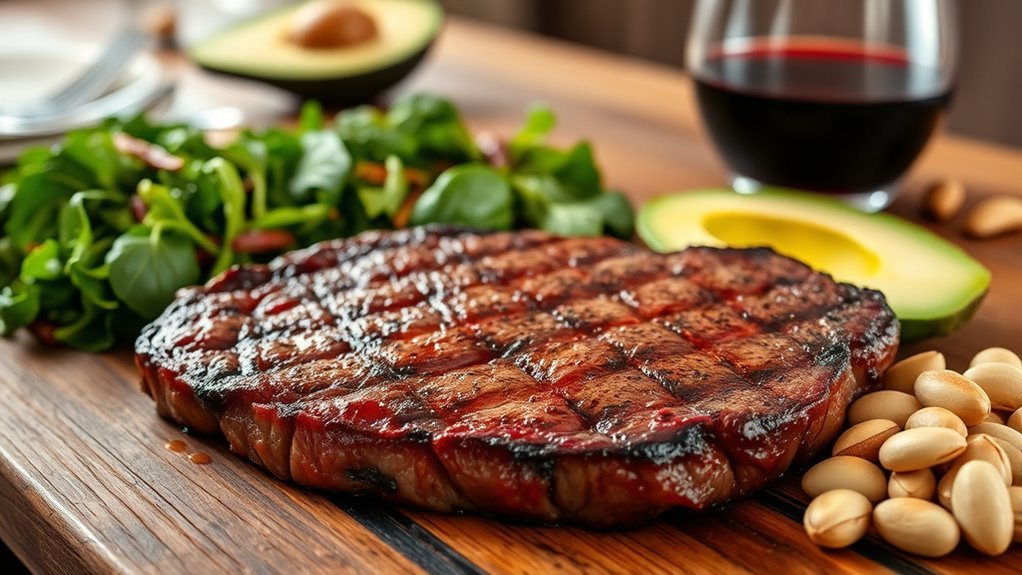Yes, you can bulk on a ketogenic diet by focusing on a high-fat, moderate-protein, and low-carbohydrate intake. This balance fuels muscle growth while maintaining ketosis, which enhances fat utilization and recovery. Incorporate resistance training with progressive overload to stimulate muscle development. Pay attention to macro ratios and consider supplements to support your gains. Adjust your calories gradually based on your body’s response. To succeed, you’ll need a strategic approach, and there’s more to explore to optimize your journey.
Understanding the Ketogenic Diet

When you immerse yourself in the ketogenic diet, it’s crucial to understand its foundational principles. At its core, the ketogenic diet emphasizes high-fat, moderate-protein, and very low-carbohydrate intake. This macronutrient ratio encourages your body to enter a state of ketosis, where it burns fat for fuel instead of carbohydrates. While this can provide significant energy and weight loss benefits, it also comes with dietary restrictions that require careful planning. You’ll need to eliminate or greatly reduce grains, sugars, and starchy vegetables, which might feel restrictive initially. However, many find the freedom of stable energy levels and reduced cravings liberating. By grasping these ketogenic principles, you can navigate the diet effectively and enjoy its potential benefits while maintaining your well-being. Additionally, understanding your daily macronutrient needs is essential for tracking success on the diet.
The Science of Muscle Growth

While many people associate muscle growth primarily with protein intake, the process is actually more complex, involving various physiological mechanisms. Understanding muscle hypertrophy mechanisms can help you optimize your training and nutrition strategies. Key anabolic signaling pathways, such as mTOR, play a significant role in muscle protein synthesis. When you engage in resistance training, these pathways activate, promoting muscle growth and repair. Additionally, maintaining ideal protein sources is crucial for supporting both recovery and overall health.
| Mechanism | Role in Muscle Growth |
|---|---|
| Muscle Tension | Stimulates hypertrophy |
| Metabolic Stress | Triggers anabolic responses |
| Muscle Damage | Initiates repair processes |
| Hormonal Response | Increases growth factors |
| Nutrient Availability | Supports recovery and growth |
How Ketosis Affects Muscle Development

When you’re in ketosis, your body shifts to burning fat for fuel, which can impact muscle growth differently than traditional diets. It’s vital to pay attention to your protein intake, as adequate levels are essential for muscle repair and development. Understanding how these factors interact can help you make informed choices about bulking on a keto diet. Maintaining 20-25% of total daily calories from protein is crucial for supporting muscle preservation while in ketosis.
Ketosis and Muscle Growth
Although many people associate ketosis primarily with weight loss, it can also play a significant role in muscle growth and development. Here are three ketosis benefits that support muscle retention:
- Enhanced Fat Utilization: Your body becomes efficient at burning fat for fuel, preserving glycogen stores for workouts.
- Hormonal Balance: Ketosis can increase levels of growth hormone and testosterone, both essential for muscle development.
- Reduced Inflammation: The ketone bodies produced may help reduce inflammation, promoting faster recovery after workouts. Additionally, understanding the science behind ketosis can further empower individuals to optimize their dietary choices for muscle growth.
Protein Intake Considerations
Protein intake plays an essential role in muscle development, especially within a ketogenic framework. When you’re bulking on keto, it’s vital to focus on high-quality protein sources. This helps not only in muscle recovery but also in preserving lean mass. Here’s a quick look at some protein options you might consider:
| Protein Source | Protein Content per 100g |
|---|---|
| Chicken Breast | 31g |
| Salmon | 25g |
| Eggs | 13g |
| Greek Yogurt | 10g |
| Tofu | 8g |
Incorporating these protein sources into your diet can help you maximize muscle growth while staying in ketosis. Additionally, ensuring you consume healthy fats alongside your protein intake guarantees you’re meeting both energy and recovery needs.
Key Nutritional Considerations for Bulking on Keto
To successfully bulk on a ketogenic diet, you’ll need to focus on several key nutritional considerations that differ from traditional bulking methods. Achieving a caloric surplus is vital, but how you do it matters. Here are three important factors to keep in mind:
- Increase Healthy Fats: Make sure to prioritize sources of healthy fats like avocados, olive oil, and nuts to fuel your body while supporting fat adaptation.
- Moderate Protein Intake: While protein is essential, avoid excessive amounts, as too much can kick you out of ketosis.
- Monitor Carb Intake: Keep carbs low to maintain ketosis, but consider strategic carb cycling if you’re looking to gain muscle effectively. Additionally, the importance of adjusting macro ratios based on individual needs can significantly enhance your bulking experience on keto.
Effective Workout Strategies for Muscle Gain
Once you’ve honed your nutritional strategy for bulking on a ketogenic diet, the next step is to implement effective workout strategies that promote muscle gain. Focus on resistance training with an emphasis on progressive overload—gradually increasing weights to stimulate muscle growth. Aim for a balanced exercise frequency, incorporating strength training sessions three to five times a week. Vary your workouts to prevent plateaus and enhance muscle endurance, using different exercises and training intensities. Don’t overlook the importance of workout recovery; giving your muscles time to repair is vital for growth. Additionally, ensure your hydration levels are maintained, as hydration is vital for keto athletes, to support overall performance. By integrating these strategies, you’ll create a thorough approach that supports your bulking goals while enjoying the freedom of a ketogenic lifestyle.
Supplements to Support Muscle Growth on Keto
To effectively support muscle growth on a keto diet, considering the right supplements can be vital. Essential amino acids can help enhance protein synthesis, while creatine has been shown to improve strength and performance in resistance training. Understanding how to incorporate these supplements can make a significant difference in your bulking journey.
Essential Amino Acids
Essential amino acids (EAAs) play an essential role in supporting muscle growth, especially for those following a ketogenic diet. EAAs are fundamental for protein synthesis and can help you maintain and build muscle mass while in a state of ketosis. Here are three key benefits of incorporating EAAs into your regimen:
- Enhanced Recovery: EAAs can reduce muscle soreness and speed up recovery after workouts.
- Muscle Preservation: They help prevent muscle loss during calorie deficits, which is critical when trying to bulk on keto.
- Boosted Performance: Supplementing with EAAs can improve your overall workout performance, enabling you to push harder and achieve better results. Additionally, healthy fats in your diet can enhance the body’s ability to burn fat for energy, further supporting your muscle-building efforts.
Creatine Benefits and Usage
While incorporating essential amino acids into your keto regimen can greatly aid muscle growth, creatine is another powerful supplement that can enhance your performance and results. Creatine comes in various types, such as creatine monohydrate and creatine HCL, each with its own benefits. Monohydrate is the most researched and cost-effective option, while HCL offers better solubility for some users. For effective muscle growth, a typical creatine dosage is around 3-5 grams daily, but it’s essential to stay hydrated. Research shows that creatine can improve strength, increase lean muscle mass, and enhance exercise performance, making it a valuable addition to your keto journey. Just remember to combine it with a balanced diet and a solid training plan for best results. Additionally, ensuring your protein intake aligns with keto diet guidelines is crucial for optimizing muscle growth and maintaining ketosis.
Monitoring Progress and Adjusting Your Diet
As you commence on your keto bulking journey, monitoring your progress is essential to confirm you’re on track and making the necessary adjustments to your diet. Here are three key strategies for effective progress tracking and dietary adjustments:
- Track Your Macros: Use apps to make certain you’re hitting your carb, protein, and fat goals.
- Regular Measurements: Monitor your weight and body measurements weekly to gauge changes accurately.
- Adjust Caloric Intake: If you’re not gaining weight, increase your calories slightly while maintaining your keto ratios. Additionally, understanding recommended daily intake of net carbs is crucial for optimizing your bulking results on a ketogenic diet.
Success Stories: Bulking on a Ketogenic Diet
Many people have successfully navigated the challenges of bulking on a ketogenic diet, proving that it’s possible to gain muscle without sacrificing your low-carb lifestyle. Success stories from fitness enthusiasts reveal how they’ve tailored their diets to increase calorie intake while maintaining ketosis. Real experiences highlight the importance of incorporating high-fat, moderate-protein foods, such as avocados, grass-fed meats, and nut butters, to fuel workouts and recovery. Many have reported significant muscle gains while enjoying the freedom that a ketogenic diet provides. By tracking macros and adjusting meal plans, you can find what works best for you. These success stories demonstrate that with dedication and the right approach, bulking on keto is not only achievable but can also be a rewarding journey.
Frequently Asked Questions
Can I Eat Carbs on a Ketogenic Bulking Diet?
Yes, you can eat carbs on a ketogenic bulking diet, especially through carb cycling. This approach allows you to enjoy higher carb days while maintaining keto flexibility. By strategically timing your carb intake around workouts, you can support muscle growth without fully abandoning ketosis. Just guarantee the overall balance aligns with your macronutrient goals. It’s all about finding what works for you while still enjoying the freedom of varied food choices.
How Do I Track Macros on a Keto Bulk?
To track macros on a keto bulk, start by using a keto calculator to determine your ideal macronutrient ratios based on your goals. Focus on high fats, moderate protein, and low carbs. You can use apps to log your food intake, making it easier to stay within your targets. Remember, flexibility is key—adjust your macros as needed to guarantee you’re fueling your body effectively while enjoying a variety of foods.
Is Intermittent Fasting Compatible With Bulking on Keto?
Yes, intermittent fasting can be compatible with bulking on keto. Imagine fueling your body like a well-oiled machine, where each meal counts and each fast allows for muscle recovery. By strategically timing your eating windows, you can still meet your macro goals while promoting fat loss. Research suggests that intermittent fasting may enhance muscle growth when paired with sufficient protein intake, so you can enjoy the benefits of both worlds without feeling restricted.
What Are the Best Protein Sources for Keto Bulking?
For keto bulking, focus on high-quality protein sources like grass-fed beef, fatty fish, eggs, and full-fat dairy. These protein types not only provide essential amino acids but also fit within your low-carb framework. Meal timing’s vital too; consider spreading your protein intake throughout the day to maximize muscle synthesis. This approach allows you the freedom to enjoy diverse meals while ensuring you’re hitting your protein goals for ideal bulking results.
How Quickly Can I Expect to Gain Muscle on Keto?
You can expect to see noticeable muscle growth on keto within a few weeks, but results vary based on individual factors like workout intensity and adherence. During the initial keto adaptations, your body shifts to burning fat for fuel, which can impact early strength gains. However, with consistent training and adequate protein intake, many people report improved muscle development after about six to eight weeks. Stay patient and focused, and the results will come.
References
- https://www.ncbi.nlm.nih.gov/pmc/articles/PMC6520956/
- https://www.health.harvard.edu/staying-healthy/the-ketogenic-diet
- https://www.webmd.com/diet/what-is-the-ketogenic-diet
- https://www.cdc.gov/healthyweight/healthy_eating/index.html
- https://www.mayoclinic.org/healthy-lifestyle/nutrition-and-healthy-eating/expert-answers/keto-diet/faq-20458452
- https://www.ncbi.nlm.nih.gov/pmc/articles/PMC8020568/
- https://www.ncbi.nlm.nih.gov/pmc/articles/PMC6520680/


